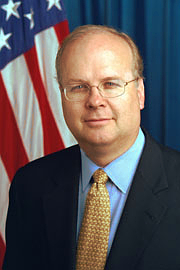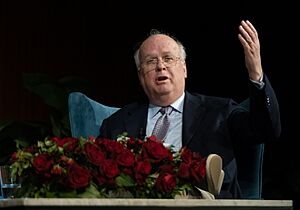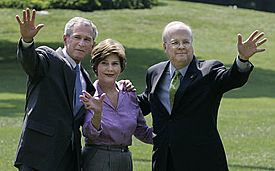Karl Rove facts for kids
Quick facts for kids
Karl Rove
|
|
|---|---|
 |
|
| White House Deputy Chief of Staff for Policy | |
| In office February 8, 2005 – August 31, 2007 |
|
| President | George W. Bush |
| Preceded by | Harriet Miers |
| Succeeded by | Joel Kaplan |
| Senior Advisor to the President | |
| In office January 20, 2001 – August 31, 2007 |
|
| President | George W. Bush |
| Preceded by |
|
| Succeeded by | Barry Jackson |
| Chair of the College Republicans | |
| In office 1973–1977 |
|
| Preceded by | Joe Abate |
| Succeeded by | John Brady |
| Personal details | |
| Born |
Karl Christian Rove
December 25, 1950 Denver, Colorado, U.S. |
| Political party | Republican |
| Spouses |
|
| Children | 1 |
| Education | University of Utah |
Karl Christian Rove (born December 25, 1950) is an American Republican political expert and advisor. He is known for helping politicians win elections and for his work in the White House. He served as a Senior Advisor and Deputy Chief of Staff for President George W. Bush. He left these roles on August 31, 2007.
Before working in the White House, Karl Rove helped George W. Bush win the Texas governor elections in 1994 and 1998. He also played a big part in Bush's successful presidential campaigns in 2000 and 2004. After leaving the White House, Rove became a political analyst for news organizations like Fox News and The Wall Street Journal.
Contents
Early Life and School Years
Karl Rove was born on Christmas Day in Denver, Colorado. He grew up in Sparks, Nevada, and later in Salt Lake City. His parents separated when he was 19.
In high school, Rove was a talented debater. He was elected student council president in his junior and senior years at Olympus High School. He was also involved with the Teenage Republicans, a group for young people interested in the Republican Party.
Rove's mother faced challenges with her health. In 1969, his adoptive father left the family. It was then that Rove learned he had a different birth father. His relationship with his adoptive father remained good. Rove's mother passed away in 1981.
Starting a Political Career
Rove began his journey in American politics in 1968. He worked on a re-election campaign for former U.S. Senator Wallace F. Bennett in Utah. This experience helped him make important connections.
College and Early Political Work
In 1969, Rove started at the University of Utah to study political science. He also got an internship with the Utah Republican Party. This led to a job on a Senate campaign in Illinois in 1970.
In 1970, Rove was involved in a controversial prank during a political campaign in Illinois. He later said it was a "youthful prank" and that he regretted it.
College Republicans and the Bush Family
In 1971, Rove left the University of Utah to become the executive director of the College Republican National Committee. He traveled a lot, teaching young conservatives across the country. He also helped with Richard Nixon's 1972 presidential campaign.
In 1973, Rove ran to become the National Chairman of the College Republicans. The election was very close and caused some debate. Eventually, George H. W. Bush, who was then the chairman of the Republican National Committee, chose Rove to be the College Republicans chairman.
As chairman, Rove introduced George H. W. Bush to Lee Atwater, who would become an important campaign strategist. Rove also met George W. Bush for the first time in 1973.
Working in Texas Politics
In 1976, Rove moved to Virginia to work in politics, focusing on direct mail campaigns. Then, in 1977, he moved to Texas.
Key Campaigns (1977–1991)
Rove's first job in Texas was as a legislative aide. Later, he worked for a political action committee (PAC) that helped start George H. W. Bush's 1980 presidential campaign.
He played a big role in Bill Clements becoming the first Republican Governor of Texas in over 100 years in 1978. Rove also worked as a deputy assistant to the governor.
In 1981, Rove started his own consulting firm, Karl Rove & Co., in Austin. This company helped many politicians with their campaigns, especially with direct mail fundraising. He sold his company in 1999 to work full-time on George W. Bush's presidential campaign.
Between 1981 and 1999, Rove worked on hundreds of political races. He was the main strategist for 41 major campaigns, and his candidates won 34 of them.
- 1978 George W. Bush congressional campaign: Rove advised the younger Bush in his first campaign for Congress.
- 1980 George H. W. Bush presidential campaign: Rove was the first person hired for this campaign.
- 1982 William Clements, Jr. gubernatorial campaign: Rove helped Clements in his re-election bid.
- 1984 Phil Gramm senatorial campaign: Rove helped Phil Gramm win a U.S. Senate seat.
- 1984 Ronald Reagan presidential campaign: Rove managed direct mail for the Reagan-Bush campaign.
- 1986 William Clements, Jr. gubernatorial campaign: Rove helped Clements win the governorship for a second time.
- 1990 Texas statewide races: Rove helped Rick Perry become agricultural commissioner and Kay Bailey Hutchison become state treasurer.
Later Campaigns (1993–2000)
- 1993 Kay Bailey Hutchison senatorial campaign: Rove helped Hutchison win a special Senate election.
- 1994 John Ashcroft senatorial campaign: Rove's company was paid a lot for consulting fees by Ashcroft's successful Senate campaign.
- 1994 George W. Bush gubernatorial campaign: Rove advised George W. Bush in his successful campaign to become governor of Texas.
- 1998 George W. Bush gubernatorial campaign: Rove was an important advisor for Bush's re-election campaign.
2000 George W. Bush Presidential Campaign
In early 1999, Rove sold his direct-mail business, Karl Rove & Co., to focus entirely on George W. Bush's presidential campaign. This was a condition Bush had set.
Working in the George W. Bush Administration
When George W. Bush became president in January 2001, Rove was appointed as a Senior Advisor. After Bush's successful re-election in 2004, Rove was also given the title of Deputy Chief of Staff to the President. President Bush publicly called Rove "the architect" of his 2004 victory.
Iraq War Discussions
Rove was involved in discussions leading up to the Iraq War. He chaired meetings of the White House Iraq Group (WHIG), which was formed in 2002. This group worked on explaining to the public why the White House believed Saddam Hussein was a threat to the United States.
Valerie Plame Controversy
In 2003, Karl Rove was involved in a controversy known as the Valerie Plame affair. This involved the identity of Valerie Plame, who was an employee of the Central Intelligence Agency (CIA). An investigation took place, and while another person was found guilty of related charges, prosecutors stated in 2006 that Rove would not be charged with any wrongdoing. Rove resigned from the White House in August 2007.
2006 Congressional Elections
Before the 2006 congressional elections, Rove believed Republicans would keep control of both houses of Congress. However, the Democrats won control of both. Rove later analyzed that scandals and a lack of quick action by some incumbents contributed to the losses.
Email Issues
During investigations into White House staff emails, it was found that some staff, including Rove, used non-government email accounts for official business. This raised questions about following government record-keeping rules.
Congressional Testimony
After leaving the White House, Rove was asked to testify before the House Judiciary Committee about certain matters from his time in the administration. He eventually agreed to testify under oath in 2009.
Life After the White House
After leaving the White House, Karl Rove became a political analyst and writer. He wrote for Newsweek and The Wall Street Journal, and became a political analyst for Fox News.
In 2010, Rove helped create American Crossroads, a group that raises money for Republican election efforts. He serves as an advisor for this group.
In 2013, Rove and American Crossroads started the Conservative Victory Project to support conservative candidates who have a good chance of winning elections.
Rove also wrote a history book called The Triumph of William McKinley: Why the Election of 1896 Still Matters, which was published in 2015.
In 2021, Rove was a guest professor at the University of Texas at Austin. He taught a course on modern American political campaigns and invited many guest speakers.
Personal Life

Karl Rove has been married three times. He first married Valerie Mather Wainwright in 1976, and they divorced in 1980. In 1986, he married Darby Tara Hickson, a graphic designer. They have one son, Andrew Madison Rove. Rove and Hickson divorced in 2009. In June 2012, Rove married Karen Johnson in Austin, Texas.
Rove lives in Georgetown, Washington, D.C., and also has a home near Austin, Texas. He also built a home in Rosemary Beach, Florida, which includes a television studio for his news appearances. Rove identifies as a practicing Christian.
See also
 In Spanish: Karl Rove para niños
In Spanish: Karl Rove para niños
 | Emma Amos |
 | Edward Mitchell Bannister |
 | Larry D. Alexander |
 | Ernie Barnes |


